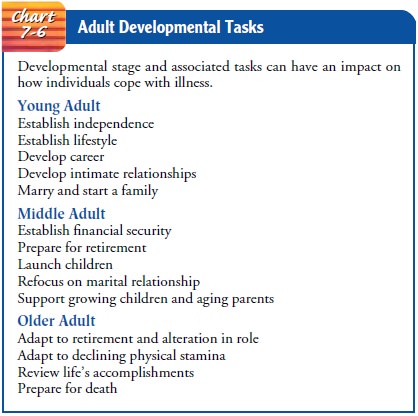Chapter: Medical Surgical Nursing: Individual and Family Considerations Related to Illness
Family Health and Distress
Family Health and Distress
The family plays a central role in the life of the patient and is a
major part of the context of the patient’s life. It is within families that
people grow, are nurtured, attain a sense of self, cultivate be-liefs and
values about life, and progress through life’s develop-mental stages (Chart
7-6). The family is also the first source for socialization and teaching about
health and illness. The family prepares the person with strategies for
balancing closeness with separateness and togetherness with individuality. A
major role of the family is to provide physical and emotional resources to
maintain health and a system of support in times of crises, such as in periods
of illness. Educating families has been shown to add to their resiliency,
adaptation, and adjustment to life stressors (Friedman, 1998).

When a family member
becomes ill, all members of the fam-ily are affected. Depending on the nature
of the health problem, family members may need to make several adaptations to
their existing lifestyles or even restructure their lifestyles.
Health problems often have an impact on the family’s abil-ity to function. Five family functions described by Wright and Leahey (2000) are viewed as essential to the individual’s and fam-ily’s growth. The first function, management, involves the use of power, decision making about resources, establishment of rules, provision of finances, and future planning—responsibilities as-sumed by the adults of the family. The second function, bound-ary setting, makes clear distinctions between the generations and the roles of adults and children within the family structure. Com-munication is the third function that is important to individual and family growth; healthy families have a full range of clear, direct, and meaningful communication among their members.
The fourth function is education and
support. Education involves modeling skills for living a physically,
emotionally, and socially healthy life; support is manifested by actions that
tell family members they are cared about and loved. Family support pro-motes
health and is seen as a critical factor in coping with crises and illness
situations. The final function is socialization. Families transmit culture and
the acceptable behaviors needed to perform adequately in the home and in the
world.
NURSING IMPLICATIONS
There are many degrees
of family functioning. The nurse assesses family functioning to determine how
the family will cope with the impact of the health condition. If the family is
chaotic or dis-organized, promoting coping skills becomes a priority in the
plan of care. The family with preexisting problems may require addi-tional
assistance before participating fully in the current health situation. In
performing a family assessment, the nurse must eval-uate the present family
structure and function. Areas of appraisal include demographic data,
developmental information (keeping in mind that family members can be in
several different develop-mental stages simultaneously), family structure,
family function-ing, and coping abilities. The role that the environment plays
in family health is also assessed.
Interventions with
family members are based on strengthening coping skills through direct care,
communication skills, and edu-cation. Healthy family communication has a strong
influence on the quality of family life and can help the family to make
appro-priate choices, consider alternative strategies, or persevere through
complex circumstances. Within a family system, for example, the identified
patient may be undergoing extensive surgery for cancer while the partner has
cardiac disease, the adolescent has type 1 diabetes, and the child has a
fractured arm. In this situation, there are multiple health concerns along with
competing developmen-tal tasks and needs. Despite the obvious concerns of the
family members, both individually and collectively, a crisis may or may not be
present. This family may be coping effectively; alternatively, the family may
be in crisis or may manifest a chronic inability to handle the situation. The
health team conducts a careful and com-prehensive family assessment, develops
interventions tailored to handle the stressors, implements the specified
treatment protocols, and facilitates the construction of social support
systems.
The use of existing
family strengths, resources, and education is augmented by therapeutic family
interventions. The nurse’s primary goals are to maintain and improve the
patient’s present level of health and to prevent physical and emotional
deteriora-tion. Next, the nurse intervenes in the cycle that the illness
cre-ates: patient illness, stress for other family members, generation of
potential for illness in other family members, and additional stress for the
patient.
Helping the family
members handle the myriad stressors that bombard them daily involves working
with family members to develop coping skills. In a 1994 study, Burr and
associates iden-tified seven traits that enhance coping of family members under
stress. Communication skills and spirituality were the most use-ful traits.
Cognitive abilities, emotional strengths, relationship ca-pabilities,
willingness to use community resources, and individual strengths and talents
were also associated with effective coping. As nurses work with families, they
must not underestimate the impact that their therapeutic interactions,
educational informa-tion, positive role modeling, provision of direct care, and
correc-tive teaching have on promoting health.
Without the active support
of the family members and the health team, the potential for using maladaptive
coping mecha-nisms increases. Often, denial and blaming of individuals occur.
Sometimes, physiologic illness, emotional withdrawal, and physical distancing
are the results of severe family conflict, violent behaviors, or addiction to
drugs and alcohol. Substance abuse is sometimes the outcome for family members
who view their ability to cope or solve problems as impossible. Often, people
engage in these dysfunc-tional behaviors when faced with difficult or
problematic situations.
Related Topics